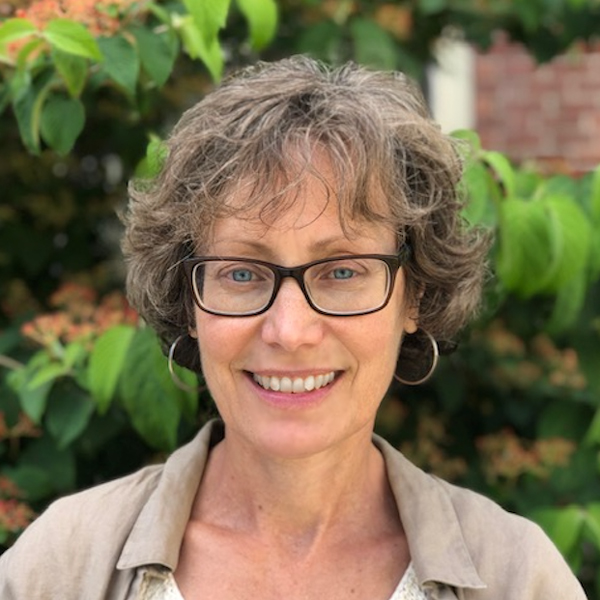Faculty Spotlight: Lori Rand, Writing Specialist
 Lori Rand is the Online Writing Specialist for the Student Academic Success Center (SASC) based here on the Portland Campus. Recently, we sat down and discussed a typical day for her, how she provides writing consultation for UNE students, and what she has found to be the most helpful for developing effective graduate-level writing skills.
Lori Rand is the Online Writing Specialist for the Student Academic Success Center (SASC) based here on the Portland Campus. Recently, we sat down and discussed a typical day for her, how she provides writing consultation for UNE students, and what she has found to be the most helpful for developing effective graduate-level writing skills.
What does a typical day look like for you?
I don’t really have a typical day! Within our online CGPS (College of Graduate and Professional Studies) student population, many – if not most – of our students work full time. This means we maintain an appointment schedule that includes evenings and weekends. Two part-time, professional writing consultants, Mary Katherine and James, also help cover these hours.
Because assignment deadlines vary, certain weeks can get very busy. I try to keep appointment hours that reflect when our online students are actively writing, and we schedule extra tutoring hours several days before final projects are due.
When I’m not in appointments with students, I work on developing and refining our online resources aimed at building skills. I also collaborate with CGPS faculty, staff, and other SASC colleagues on identifying areas of student need and finding ways to address those needs.
Learn more about our online graduate programs
How does an online tutoring appointment work?
We use the TutorTrac scheduling system so students can search 24/7 for times that work best. Once a student makes an appointment, the writing consultant gets in touch to explain the process in more detail. We ask that students plan to send their draft a few hours ahead of time so we can prepare thoughtful feedback and recommend other resources.
The appointments are in real-time and interactive: students can ask questions and practice some revising or editing skills during the meeting. We generally use a web conferencing platform called Zoom, but we can meet by phone if a student prefers. It’s also great to be able to have a conversation in person, so we also have the option of meeting in the SASC office if the student is local.
What are the most common issues that you help students with?
Many students come to us with issues related to citation and formatting, or concerns about grammar. Those are great reasons to make an appointment, but we don’t stop there. During a review, we also assess which higher-level writing issues need the most attention. Usually that means revision, which is improving areas like focus, development, organization, and source integration. We discuss using sources appropriately, and give students the opportunity to practice summarizing and paraphrasing skills, to help them avoid plagiarism.
Finally, we do point out patterns of sentence-level or grammatical errors so students can learn to identify and correct those types of issues—but rather than acting as “editors,” we are providing instructional feedback.
Our appointments are instructional because our goal is for all students to become better writers, not just improve the writing in one paper. Plus, throughout the process of talking about how to write well, you’re really learning to think clearly too.
Read more: How does an online course work at UNE Online?
So, revision is really how you bring an assignment to the next level?
Absolutely. Revision and editing are often confused as the same thing. Revision is taking care of the major issues, usually related to how clearly and logically ideas are presented at the paper and paragraph levels; editing is correcting sentence-level problems towards the end of the writing process.
I’d like to emphasize we’re helping to develop skills that students can use for future papers and in their professional careers. A SASC appointment is not just a quick consultation where we look at your paper and fix the grammatical errors – we focus more on identifying patterns and strategies to become a better writer. It’s a valuable skill, both academically and professionally.
How do you recommend going about tackling a big writing project?
I recommend that students find an angle or a part of a topic that gets them jazzed and curious. How is this topic professionally and personally relevant? Rather than simply viewing the writing assignment as a mandatory task, the more meaningful you can make a writing project, the more you will learn. During an appointment, we can discuss using questions, pre-writing strategies, and the assignment description as ways to start organizing ideas before the drafting phase.
Prioritizing and planning writing time is one of the most important ways to manage a project. Because juggling life and school creates a time crunch, I know it’s tempting to sit down and write a paper near the deadline, but breaking the writing down into steps over time can make an assignment feel less overwhelming. Also, allowing yourself enough time makes a significant difference in the quality of your thinking and writing.
What do you like about working with UNE students?
I love helping students find ways to get better at writing and gain confidence. It’s amazing to see how practicing a few strategies can really change the clarity of a paper. I see learning happening as students think about how to structure and communicate their ideas. It’s fun to see the progress.
Even confident writers can benefit from having a conversation about the reader’s perspective. When you visit SASC, it’s an opportunity to grow your skills. That’s what we’re here for.
Learn more
Would you like to be able to check in with Lori and SASC as you progress through your graduate-level writing assignments? Consider one of UNE Online’s graduate programs in the health professions by downloading our online program guide today: